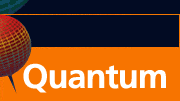CONTACTS
- Coordinator
Adolfo del Campo
-
Quantum Lunch Location:
T-Division Conference Room, TA-3,
Building 123, Room 121
 |


Quantum Institute: Visitor Schedule
The Quantum Lunch is regularly held on Thursdays in the Theoretical Division Conference Room, TA-3, Building 123, Room 121.
The organizing committee includes Malcolm Boshier (P-21), Adolfo del Campo (T-4 & CNLS), Michael Di Rosa (C-PCS), Armin Rahmanisisan (T-4 & CNLS), Changhyun Ryu (P-21) , Nikolai Sinitsyn (T-4), Rolando Somma (T-4), Christopher Ticknor (T-1), and Wojciech Zurek (T-4).
For more information, or to nominate a speaker, contact Adolfo del Campo.
To add your name to the Quantum Lunch email list, contact Ellie Vigil.
Thursday July 24, 2014
12:30 PM - 2:00 PM
Speaker: Jess Riedel (IBM)
Technical Host: Wojciech Zurek
TOPIC: Dephasing channels for overcomplete bases
Abstract
Important to understanding the quantum-classical transition is the concept of ``pure decoherence''. Mathematically it is described by a dephasing channel, i.e. a trace-preserving completely positive (CP) map on density matrices that fixes a certain orthogonal basis of quantum states but in general modifies and suppresses phases between them. However, pure decoherence is an idealization best suited for discrete systems like spins, and in particular is not directly applicable to continuous systems like a point particle for which no countable basis respects translational symmetry in phase-space. Here we identify a natural generalization of a dephasing channel for an overcomplete basis (more precisely, for a Parseval tight frame and its associated POVM). Our primary example is collisional decoherence, which can be decomposed into a combination of unitary evolution and a generalized dephasing channel with respect to the twisted coherent states. We draw a connection to the Husimi Q function, generalizing that function to off-diagonal terms that measure coherence between widely-separated wavepackets. This construction is useful for understanding decoherence in the $\hbar \to 0$ classical limit embodied by Koopman-von Neumann mechanics, where wavepackets take on simultaneously exact values of position and momentum but nevertheless enjoy relative phases.
|


